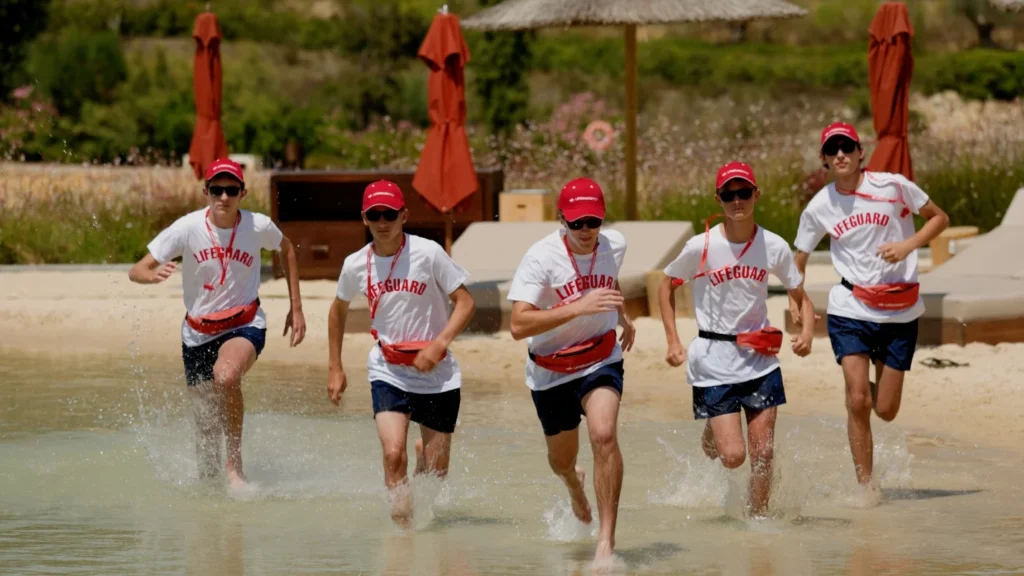Lifeguarding is a dedication to safety, discipline, and quick thinking action, not only a seasonal job. Taking a course in lifeguarding to learn a skill in teenage years leads to the development of that profession with satisfaction and expertise. The skill of lifeguarding has increased in demand recently due to the recession in lifeguard personnel. The lifeguard shortage during recent years after the pandemic has made this industry open for a professional career that is rewarding and satisfactory.
When you think of being a lifeguard, do not just think about a long chair at the beach or a swimming pool, it is much more than that. The job has responsibilities. Good lifeguard programs help teenagers develop these key abilities, preparing them for long-term personal development as well as emergency circumstances.
There’s so much more to discover—browse our related posts!
Knowing Lifeguarding: What It Means
Constant watch, quick decision-making, and physical endurance to save lives define being a lifeguard. First responders in water-related crises are lifeguards whether employed at a small neighborhood pool or a crowded beach. What you really want to know being a vigilant lifeguard is to stay attentive to the situation all the time. Lifeguards should be prepared for every type of emergency and possible water dangers that will impact swimmers.
Lifeguards do more than just save lives; they also ensure the facilities are clean and regulate the rules and regulations of their facility so that all the patrons can enjoy their leisure experience as safely as possible. For teenagers wanting more than just a pay cheque on summer break, this combination of duties provides a challenging yet extremely rewarding context.
Why Lifeguard Certification Important?
For teenagers to work as a lifeguard, certification is not only recommended—it’s required. A reputable lifeguard certification program guarantees that candidates are totally qualified in CPR, first aid, water rescue, and emergency readiness.
Generally speaking, certification courses include:
- Adult and children CPR and AED instruction.
- First aid education for a range of injuries, including burns, sprains, and wounds.
- Passive and active victim recovery among water rescue methods.
- Techniques to increase scan efficiency and lower response time are surveillance ones.
- Exercises for real-life rescue simulations involving teamwork and communication.
Typically valid for two years, these certifications require recertification to remain active. Certifying yourself as a child or youth will also set you up for advancement in senior positions, such as head lifeguard, instructor, or aquatics supervisor, in the future.
Essential Lifeguarding Abilities Every Teen Should Perfect
Let’s divide the fundamental abilities every teenage lifeguard should have:
1. Good Swimming Skills
Though it may seem obvious, great swimming ability underlies all other abilities of a lifeguard. Teenagers need to be able to dive precisely, swim many laps regularly, and tread water. Many times, lifeguard courses have swimming tests as part of their entrance requirements to guarantee that those enrolled have the physical capacity to conduct rescues under different water circumstances.
2. Surveillance and situation awareness
Scanning is a skill that is more than just watching swimmers. Lifeguards need to actively scan the water for patterns, look for subtle signs of distress, and anticipate dangerous behavior before an accident occurs.
At the same time, to maintain a safe environment, there is also an element of situation awareness — keeping an eye on the activities of patrons, looking at the water’s edge on equipment, and assessing environmental conditions.
3. Emergency response and rescue procedures
New lifeguards are trained to respond to emergencies and be ready for any types of water hazards. They learn on the job more than in the actual training. They learn new rescue methods and also using the equipment that saves lives (e.g., backboards or personal flotation devices).
Teenagers Should Expect from Lifeguard courses
For any teenager serious about becoming a professional lifeguard, the first step is enrolling in a lifeguard course. Conducted over weekends or spaced throughout several weekdays, these classes normally run 20 to 30 hours.
Participants will learn during the course:
- Considerations for ethics and legal obligations.
- Strategies of recognition and response for troubled swimmers.
- Hands-on rescue training in pools and open water (depending on the course).
- How to avoid drowning and lower water-related risks.
Teachers give teens feedback and use real-life situations to support technical and psychological development. Participants undergo written and physical examinations after the program to guarantee complete competence.
Benefits Beyond The Pool
Teenagers learn life skills from lifeguarding that go far past the shoreline. Among these are:
- Handling school, training, and employment helps one develop discipline.
- Knowing how to rescue a life gives one great self-assurance.
- Teens learn how their actions (or inactions) can have severe repercussions.
- Teaming with other lifeguards helps to promote cooperation and cooperation.
- Career preparation: Lifeguarding might open doors to jobs in health care, education, or aquatics management or to positions in emergency services.
Teenagers retain these experiences of their life, therefore strengthening resumes and college applications as well.
Final Thoughts: For Teens, Lifeguarding Offers Life-Changing Possibilities
Teenagers seeking purpose, duty, and a way to change society find an unequalled opportunity in lifeguarding. Teenagers learn vital skills from rescue techniques to first aid via accredited lifeguard classes as they become robust, responsible people.
Teenagers have never had a better opportunity to gain their lifeguard certification and answer the call to save lives—one swim at a time—with groups like the American Lifeguard Association guiding the way in advancing safety and professional standards.
Don’t miss out on more great reads—click through our featured posts!






